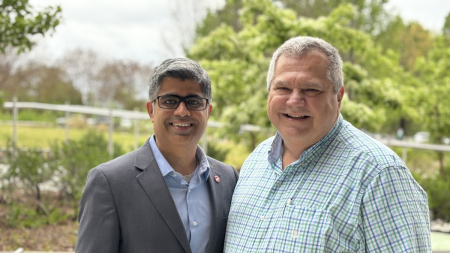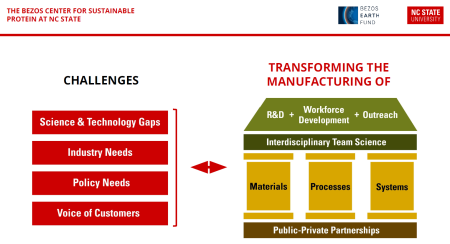The Faces of the Future of Sustainable Proteins

By now, you’ve heard the buzz about the new Bezos Center for Sustainable Protein at NC State University.
Thanks to the Bezos Earth Fund—a billion dollar fund established by Jeff Bezos “to fight climate change and protect nature”—NC State earned a $30 million dollar grant over the next five years to focus on sustainable proteins.
But do you know how we got here and where we are going? Co-Directors Dr. Bill Aimutis and Dr. Rohan Shirwaiker worked diligently on the win way before May’s announcement.
How We Got Here
Since 2022, Shirwaiker and Aimutis have conducted various alternative protein ecosystem building activities at NC State. These involved stakeholders from academia, industry and government.
The Good Food Institute, which managed the Sustainable Protein Centers of Excellence grant program for the Bezos Earth Fund, participated in some of these activities.
Later in February 2023, the NCALS Research Foundation connected Aimutis with Andy Jarvis, director of Future of Food for the Bezos Earth Fund, to introduce him to NCFIL.
This groundwork set the stage for what was to come.
From there, NC State was one out of 14 universities globally invited to apply for the grant and submitted the grant proposal in September 2023. The Bezos Earth Fund team conducted a site visit in November.
NC State ensured that team met all significant players in the proposal—from scientists and students to industry partners and NC State Chancellor Randy Woodson—as competition was tight.
“We were one of the top proposals that came through the system,” says Aimutis. “We were the only ones selected in the U.S., and we were competing against several strong teams across the country.”
Fast forward to May 31, 2024, and the Bezos Center for Sustainable Protein at NC State is launched, with Aimutis and Shirwaiker at the helm.
Sustainable Protein Research Hub
The Center is focused on advancing biomanufacturing of sustainable proteins in three areas: plant-based proteins, precision fermentation and cell-cultivated meats.
“Or a combination thereof,” Shirwaiker adds,” as we will also create enabling technology for hybrid products that are most likely to be successfully commercialized in the foreseeable future.”
Shirwaiker and Aimutis are the inaugural Co-directors of the Center. As the Chief Operating Officer (COO), Aimutis will handle the center’s operations and industry partnership activities. As the Chief Scientific Officer (CSO), Shirwaiker will manage the center’s technical research and education activities.
Shirwaiker confirms that he and Aimutis have a shared philosophy on sustainable proteins.
“It is not our goal to replace animal protein in the future,” says Shirwaiker. “We understand there are challenges in feeding our growing population, and we cannot rely on standard sources today. We want to work on this, so we can supplement the needs of the growing population. It’s about creating more food choices that are sustainable.”
R & D, Workforce Development, Outreach
The Bezos Center for Sustainable Protein is headquartered on the NC State centennial campus. The center will also leverage resources at the NC Food Innovation Lab, Biomanufacturing Training & Education Center (BTEC), and other facilities at NC State.
The center engages over 25 academic researchers from multiple North Carolina universities, plus over 20 corporate supporters. These supporters range from start-ups to large corporations and include software and equipment manufacturers, consumer-focused market analysis providers and finished product manufacturers.
“Our goal is to have 50 companies involved with the center,” says Aimutis. “They will help prioritize our research directions. And the research will address the needs and gaps of the industry.”
Aimutis presents the center’s three central functions: research and development, workforce development, and outreach and capacity building.

Research + Development
Research and development will focus on three categories:
- The first focus is researching the different processes utilized to manufacture sustainable proteins, from hardware to software technologies.
- The second focus is on the materials utilized, taking a look at next generation plants, crops, and cell cultures capable of producing alternative proteins.
- The third research focus is on systems, investigating the techno-economic perspective of protein production and market dynamics.
“This research is very complex,” Aimutis says. “It is research that must be done to accelerate the commercial launch of these proteins as well as encourage consumer acceptance.”
Workforce Development
This center will focus on internal and external workforce development; the goals are to:
- Develop training courses for the next generation of workforce in food manufacturing;
- Develop programs for laypeople and K-12 teachers and students, educating them on proteins, sustainability and eating habits; and
- Create professional development for team members and entrepreneurs, including how to get products to market faster.
Outreach + Capacity Building
It’s important for the center to build sustainable protein awareness and acceptance; we will focus on:
- Understanding the voice of the consumer or customer;
- Understanding and informing the policy and regulatory landscape of alternative proteins; and
- Hosting various technical and community building activities with local, national and global participants.
What’s Ahead?
The ultimate goal is to grow the Bezos Center for Sustainable Protein to become the hub for alternative protein biomanufacturing in the country, so the next six months will be critical in establishing the center’s foundation.
Aimutis and Shirwaiker are setting up the lab’s infrastructure, both human resources and Innovation Foundry, the physical lab.
Equipment acquisition is in progress, and a culture of team science and team-based research is growing.
“I am excited to have over 25 people coming together from diverse backgrounds, experiences and technical trainings,” says Shirwaiker. “Getting interdisciplinary teams together and working is what will really have an impact and help us think out of the box.”
As a co-director, Aimutis’ existing role with NCFIL will reduce to 15% of his time as he operates at NC State three days per week. To account for this transition, Aimutis promoted Joe Hildebrand to NCFIL operations manager and will name a new NCFIL director in the coming months.
NCFIL will also undergo transition as 20% of the lab will be dedicated to the plant protein side of the Bezos Center, resulting in one day per week being solely dedicated to alternative proteins.
While Shirwaiker has been a NC State faculty since 2011, he will experience transition as well. An Industrial and Systems Engineer by training, he has been curious in the biomedical and biological domain for some time.
Three or four years ago, Shirwaiker was pulled into the cultivated meat field to review papers and grants, and he found the research fascinating.
“As I got older, the importance of health, environmental sustainability , and food security started mattering more,” says Shirwaiker. “I started to consider how my skills in manufacturing and biomedicine could apply to food products.”
Complementary Talents
It makes sense, then, that when Bill and Rohan met, they clicked.
“We had a similar vision for NC State, and we complement each other well,” says Shirwaiker. “Bill brings the industry side of things. And I come from the academic research and teaching side.”
Now, they are teamed together with a common goal: to identify and solve problems to help the sustainable protein industry.
“My greatest hope is that we can generate new technology to create new products at scale and at price parity with existing sources,” says Shirwaiker. “There has been negligible open access research on scaling and translation.
“That is where we hope to make the most impact.”
It is not lost on Aimutis or Shirwaiker that they are on the forefront of the sustainable protein industry—or that this center is the first of its kind and the only one being funded in the country at this magnitude.
Together, they are up for the challenge.
For more information about the Bezos Center for Sustainable Protein, please contact bezoscenter@ncsu.edu.
- Categories: